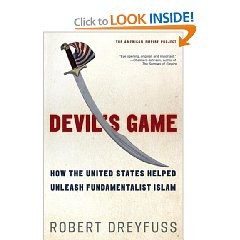
![]() Truly Brilliant, Reflects a Sea Change in Scholarship
Truly Brilliant, Reflects a Sea Change in Scholarship
July 31, 2007
Donald E. Schmidt
There are some fine reviews, so my primary purpose in posting this review is to flag it for the folks that keep an eye on what I read.
My one complaint is the tiny font size. I had to get special glasses from the supermarket to read this book, a $15 cost that should not have been necessary. The publisher made a serious mistake on the font size and I urge that all future printings be at least 11 font. This entire book is in a font normally used for obscure notes, and it takes dedication to get through this. Such valuable material should NOT be so parsimonesouly treated by a publisher, who should have known better.
I am among those that believe that war is a racket and that we live in an unconquerable world where the only possible positive outcome comes from combining the wealth of networks with the new craft of intelligence and free distance learning as well as on demand answers via cell phone, in order to empower the five billion at the base of the pyramid. Only they can create infinite wealth that stabilizes the entire planet in a sustainable fashion.
This author has ventured where few have had the imagination, persistence, or integrity to go. He has taken on the military-industrial establishment, the banks, the rule by secrecy and scarcity mandarins, and he has nailed it. This is a Nobel Prize level effort and I for one am deeply impressed.
His organization is superb, and even his fanciful conversation among all our Presidents is provocative. This is not “turgid text,” this is the fabric of history restored and rewoven.
Shortly Medard Gabel will have a book come out entitled “Seven Billion Billionaries,” and I urge one and all to buy that book along with this one. They are two sides of the coin. This book is focused on the folly of war (which today costs $900 billion a year across all nations, with the USA being the most spendthrift), while Medard's focuses on the inexpensiveness and achievability of peace and prosperity–in his carefully documented manuscript, every bit the equal of this author's, he shows how $230 billion a year–LESS than a third of what we spend on our varied militaries, could resolve every single one of the high level threats to mankind identified by LtGen Dr. Brent Scowcroft, USAF (Ret), and the other members of this United Nations panel.
I hope this book is put into the digital domain prompty, for the wealth of information it contains will be made all the more valuable as we move to an era of transparent budgets, digital democracy, and constant oversight from the people whose money has been wasted so cruelly all these years.
See my many lists for other recommended readings. Below are a handful of books that complement this one.
War Is a Racket: The Anti-War Classic by America's Most Decorated General, Two Other Anti=Interventionist Tracts, and Photographs from the Horror of It
The Unconquerable World: Power, Nonviolence, and the Will of the People
The New Craft of Intelligence: Personal, Public, & Political–Citizen's Action Handbook for Fighting Terrorism, Genocide, Disease, Toxic Bombs, & Corruption
Designing Web-Based Training: How to Teach Anyone Anything Anywhere Anytime
Blessed Unrest: How the Largest Movement in the World Came into Being and Why No One Saw It Coming
The Sorrows of Empire: Militarism, Secrecy, and the End of the Republic (The American Empire Project)
Rogue Nation: American Unilateralism and the Failure of Good Intentions
Wilson's Ghost: Reducing the Risk of Conflict, Killing, and Catastrophe in the 21st Century
Deliver Us from Evil: Peacekeepers, Warlords and a World of Endless Conflict
The Shock Doctrine: The Rise of Disaster Capitalism









